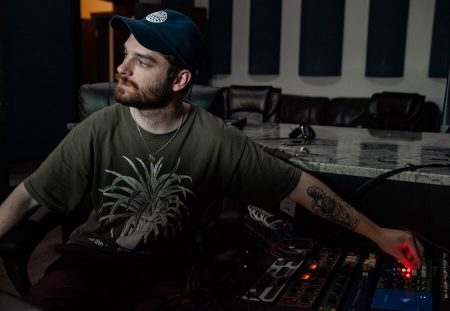
Recording Connection grad and mentor Ryan Venable
Since graduating Recording Connection in 2013,
Ryan Venable has worked with major talents like Snoop Dogg, Justin Bieber, DJ Khaled, Fetty Wap, Travis Scott, and Young Thug and garnered four RCAA Platinum credits along the way. We recently touched base with the engineer/producer to learn more about how he made his dream career reality.
What got you interested in audio in the first place?
“I would say I’ve just always been more inclined to the art of music I feel like more than other people. Whenever I was younger I just always was able to kind of just assess music and kind of tell what is good music versus not good music in my mind…Growing up, none of my family or anything was into music, none of them played instruments, none of them had anything to do with the studios.”
So you eventually you signed up for Recording Connection but prior to that you actually attended a large state university with the plan of getting into audio. Why did you choose Recording Connection?
“I didn’t really want to go back to another university… I was also looking for the most cost-efficient way. I’m not trying to go to someplace that’s going to put me in a big hole, and Recording Connection was both, they seemed like they had everything that I wanted to learn… You guys just seemed like the route to go.”
So you had your mentor interview with Ricky Rich of Studio 713. What were your thoughts on 713?
“I was impressed with the studio. It had a big Studio A room. Before that, you know, I had been in a couple closet studios. I had never really been in a real studio before that. So you walk in, and there’s a big lobby. The first thing they show you is Studio A big control room, ISO booth, live room, all types of equipment, big board. At that time that board to me looked huge, and then shortly after that you see big SSL boards and Neves and stuff like that, but the C24 is still an amazing board for doing in the box stuff.
And then he showed me the rest of the spot. There’s a Studio B, which is awesome because it really allows the students that are here to spend time in there whenever there’s not a session going on in there. You know, it’s a whole setup that they can go in there and tinker around with Pro Tools, they can pull up their beat making machine or whatever they have.”
So when you started the program you were pretty new to audio, correct?
“For the most part, I mean, I knew there was a recording booth, I knew there was an audio engineer, and I knew you could record somebody and somehow it would turn out a polished product. I didn’t really understand the whole in-depth part of it. I did know what an equalizer was. but I didn’t know the mechanics of a compressor, I didn’t know the mechanics of a reverb, I didn’t know what mic sound, I didn’t know there was this type of mic for this type of performance rather than this type of performance, and yeah.”
So I would say I was very green. I just truly believed in my ear, in knowing how to take something and make it great, because I knew what great music should sound like, and it would only just take a matter of time, and I know I would be able to accomplish that…That’s pretty much the knowledge I knew, and then the curriculum kind of took it from there, and the engineers [mentors] helped from there as well.”
Here’s where your story takes an unexpected turn. While you were doing your apprenticeship (externship) at 713, you held down a well-paying job as an AutoCAD drafter, even after graduating Recording Connection. How did you keep audio in your life?
“I started looking for freelance work and stuff like that, and luckily I had met somebody that went to my high school…I didn’t really go in there expecting much, [but] when I first met him and heard his music, I was very impressed and liked who he was as a person. I was like, ‘Look, you need recording. I need to record. If you want to work, you’re more than welcome to work as much as you want to work.’ So that kind of just sparked a relationship with this artist.
I worked with him for about three years straight, and that was pretty much on a nightly basis, because we lived a couple streets away. And that was just grinding from 6:00 p.m. to 2:00 a.m. or whatever it was until I had to go back to work. Just having that relationship with him and that experience of always recording somebody, always trying to make their stuff sound better, really gave me a lot of experience with Pro Tools. Being efficient at Pro Tools is one of the number one things that you have to be to be a good engineer nowadays in 2018.”
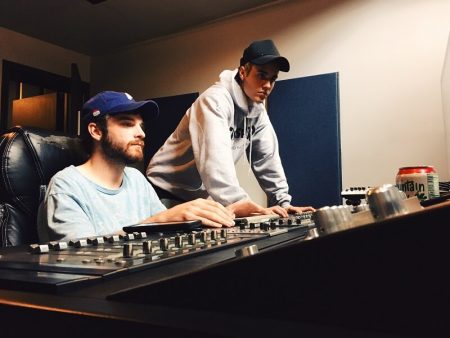
Ryan Venable and Justin Bieber at Studio 713
“I took that as the universe telling me to kind of just go for it, pushing me towards music, and I was just like, ‘I’m not going to look for another corporate job, I’m not going to look for another part-time waiter job, I’m not going to do that. I’m going to completely commit to music.’ And my first instinct was to contact the people that I knew in my connections which was Studio 713.”
So you reached out to your old mentor Ricky Rich. What did you say?
“‘I’m looking for an opportunity. Is there anything I can do?’ He said, ‘You can come in next week and show us some of your stuff, and we can talk and sit down and see what we can do.’”
You played a number of your mixes for Ricky and John (a former engineer at 713) and they hired you but told you it wasn’t for the top job at 713:
“[They said] we like you, we know you can accomplish the music side, and we know you’ve been here, so you know what’s expected and how to go about things here. So we would like to have you, but there’s also three engineers ahead of you, and you are going to be the fourth engineer in line. So you more than likely are going to have to get a lot of your own clients.
I was like, ‘That’s fine. I just need a foot in the door and whatever I can do, I’ll do.’”
Turns out those words “whatever I can do” quickly became your reality. Tell us about that.
“When I first got hired, it was like the week before the 4th of July. I don’t remember the exact details, but the other engineers, they must have probably gone on vacation or something like that…I had my own 4th of July plans set with a couple friends to go to the river…But once Ricky told me ‘There are going to be sessions. Do you want to do them?’ I was like, ‘Okay, I might need to reevaluate what I want to do this weekend.’
And that kind of was a moment where you kind of realize if you’re going to be an engineer, there’s going to be some sacrifices, it’s going to be kind of up to you if those sacrifices are worth it…
So I went ahead and committed to those sessions. That was my first couple sessions that 4th of July weekend, I remember. And they went smoothly. I definitely remember being very nervous my first time, just because it’s such new territory and you’re having to do these things for clients you haven’t met…Those types of beginning butterflies were definitely there.”
After you’d committed to the work, knowing you’d have to hustle to build the career you wanted, the unexpected happened:
“Ricky called me and the third engineer in line, and he’s like, ‘So are you guys ready to step up?’ And I was like, ‘Yeah. I honestly was about to go turn in an application for a part-time job.’ He was like, “You won’t be needing that now.” That was awesome at the same time, but it was also like, ‘Oh damn, this is actually happening.’ …That was just an incredible opportunity. So I went from fourth engineer in line and having hardly any sessions, one once or twice a week, to working almost fulltime.”
What led up to you working with Justin Bieber?
“I don’t know how the saying goes…Luck happens whenever preparation meets opportunity… I was here [at 713] for a good two years… working with music every day and I was working with some decent people here and there…
I had sessions booked from, like, 6:00 p.m. to 2:00 a.m. and it was like a Friday, and I was chilling at my house about 3:00 p.m., and Ricky Rich, my boss calls me, and he’s like, ‘What are you doing?’ I said, ‘I’m honestly just laying in bed waiting until 6:00 for work.’ And he’s like, ‘All right, well how fast can you be to the studio?’ I was like, ‘Well, I haven’t showered, I haven’t really eaten lunch.’ And he’s like, ‘Well, Justin Bieber wants to work.’
He said that, and I was like, ‘Oh damn, all right. Well, I think I can skip lunch for Justin Bieber.’ So obviously, I sprang out of bed, put some clothes on, and headed to the studio…
The ability to work with the artist on that magnitude of level and still be comfortable definitely helped the session along. He was an amazing person. Literally to this day still one of the most amazing sessions I’ve had. He was a very respectful, down to earth person…He ended up inviting pretty much the whole studio to the show. Ricky and his kids as well. So it was an amazing opportunity and amazing time, that just kind of a picture perfect session with a big artist.”
And you recently worked with Travis Scott for a track on the Black Panther album.
“I actually went to Travis’ house to record Travis that day, which was pretty cool to see just how he has his home setup… I definitely knew this song was going to be awesome. I didn’t know it was going to be a Black Panther song. I thought it was just going to be a normal song on one of their albums or something. So it was even cooler once I figured out that it’s on the Black Panther album, which is another platinum album and whatnot. So that was a really cool experience.”
So how can current Recording Connection students make the most of the program while they’re going through it?
“So being able to just be here and be aware of what’s going on and what’s needed is awesome. Also just sit in on sessions. You will never know what’s going to happen in a session. It might be an awesome session where everything went smooth and you see a real good artist working, and those sessions are incredible. You see good artists working and you see me being able to accomplish these ideas that I have on a very good level and being able to execute them and they turn out well. And then you may sit in on a session that the artist is not as good, and you’re having to see me compensate for that and try to make them sound better and try to lead them and make them feel confident. And a lot of times your job as an engineer has nothing to do with music. You have to be able to understand what the artist needs, how to keep them confident, how to keep them comfortable…
But if you’re just always looking for something to be popping off at all times…for Travis Scott to be here or Mike Jones or whoever, if you’re just here looking for the fun all the time, and needing direct rewards and stimulation, then you just don’t, it’s going to take you a little bit longer to understand what type of job this is.
The ability for this program to be able to just sit behind an engineer is an incredible opportunity that you can learn so much from. You can read a book all you want, but seeing an engineer working and seeing how they adapt and troubleshoot and why they do this or that is one of the best ways to learn.”
Besides being a Recording Connection graduate, Ryan Venable is also a mentor! Learn how you can train with Ryan by contacting an
Admissions Representative.
Connect with
Ryan Venable aka Ryan Mellow on Instagram.
* * * * *


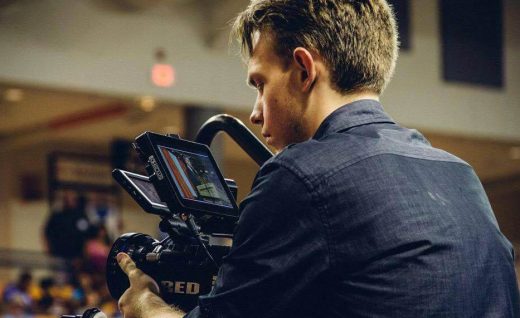
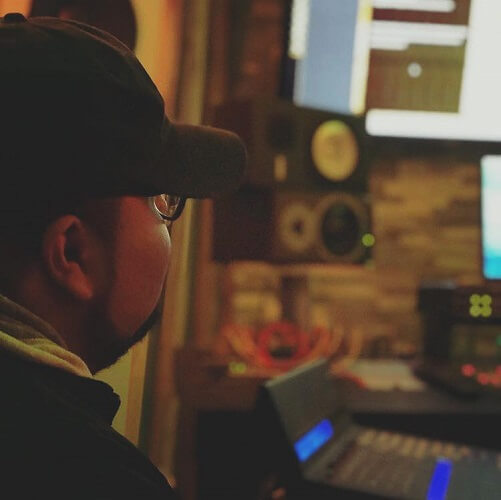 Congrats to Jose Castrejon on finishing Recording Connection’s Advanced Audio Engineering program! Speaking of his experience training with Ira Parker of Maximus Music Records:
“The guys [at Maximus] constantly push you to be better you than the day before…Watching them engineer and mix is one of the best experiences a student can have…The techniques and tips that [were] told in class I constantly applied due to the fact that I got the chance to record a two-track with a rap artist and…a Corridos band with an accordion, bass guitar, twelve string guitar, and two vocalists…Putting the Sony C800G on it and running through an LA2A and an MC77 was crazy! The sound was just extraordinary…All I want to say for future students is if the opportunities are there and you don’t take them that’s your loss…Learn as much as you can, try to be at the studio as much as you can, help around because gaining your mentor’s trust is one of the best things life can hand you.”
Congrats to Jose Castrejon on finishing Recording Connection’s Advanced Audio Engineering program! Speaking of his experience training with Ira Parker of Maximus Music Records:
“The guys [at Maximus] constantly push you to be better you than the day before…Watching them engineer and mix is one of the best experiences a student can have…The techniques and tips that [were] told in class I constantly applied due to the fact that I got the chance to record a two-track with a rap artist and…a Corridos band with an accordion, bass guitar, twelve string guitar, and two vocalists…Putting the Sony C800G on it and running through an LA2A and an MC77 was crazy! The sound was just extraordinary…All I want to say for future students is if the opportunities are there and you don’t take them that’s your loss…Learn as much as you can, try to be at the studio as much as you can, help around because gaining your mentor’s trust is one of the best things life can hand you.”
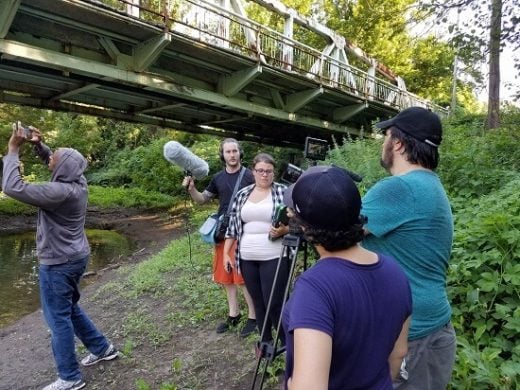 Film Connection student Mike Whitehead who trains with mentor Rocco Michaluk at Rocco Films is glad to be getting some hands-on experience prior to starting production on his own upcoming project:
“Wrapped up production with last day/night of shooting for “A Life Worth Living.” Assisted with usual tasks as well as learned a few quick tips on the fly, including lighting and setting up camera tripod rails and sandbags. [I] also got to fill in as an extra for a brief scene. Thankful for this opportunity to be introduced to the [short] filmmaking process, and get my feet wet in anticipation for my potential short film.”
Film Connection student Mike Whitehead who trains with mentor Rocco Michaluk at Rocco Films is glad to be getting some hands-on experience prior to starting production on his own upcoming project:
“Wrapped up production with last day/night of shooting for “A Life Worth Living.” Assisted with usual tasks as well as learned a few quick tips on the fly, including lighting and setting up camera tripod rails and sandbags. [I] also got to fill in as an extra for a brief scene. Thankful for this opportunity to be introduced to the [short] filmmaking process, and get my feet wet in anticipation for my potential short film.”
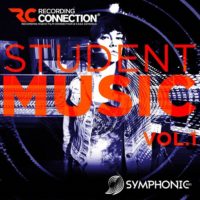 Heard our Student Music Mixtape yet? In partnership with Symphonic Distribution, we’re excited to help our students get their music out to the world!
The Recording Connection is now offering this great opportunity for our students to broaden their understanding of the new role digital distribution companies like Symphonic Distribution can play in helping release their tracks and propel their careers forward!
Heard our Student Music Mixtape yet? In partnership with Symphonic Distribution, we’re excited to help our students get their music out to the world!
The Recording Connection is now offering this great opportunity for our students to broaden their understanding of the new role digital distribution companies like Symphonic Distribution can play in helping release their tracks and propel their careers forward!



